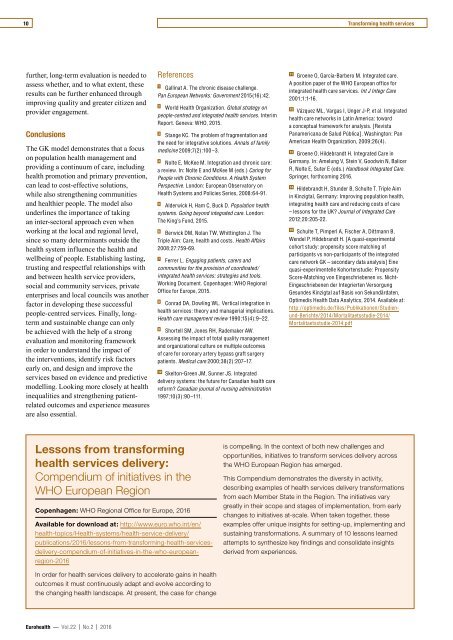EUROHEALTH
Eurohealth-volume22-number2-2016
Eurohealth-volume22-number2-2016
Create successful ePaper yourself
Turn your PDF publications into a flip-book with our unique Google optimized e-Paper software.
10<br />
Transforming health services<br />
further, long-term evaluation is needed to<br />
assess whether, and to what extent, these<br />
results can be further enhanced through<br />
improving quality and greater citizen and<br />
provider engagement.<br />
Conclusions<br />
The GK model demonstrates that a focus<br />
on population health management and<br />
providing a continuum of care, including<br />
health promotion and primary prevention,<br />
can lead to cost-effective solutions,<br />
while also strengthening communities<br />
and healthier people. The model also<br />
underlines the importance of taking<br />
an inter-sectoral approach even when<br />
working at the local and regional level,<br />
since so many determinants outside the<br />
health system influence the health and<br />
wellbeing of people. Establishing lasting,<br />
trusting and respectful relationships with<br />
and between health service providers,<br />
social and community services, private<br />
enterprises and local councils was another<br />
factor in developing these successful<br />
people-centred services. Finally, longterm<br />
and sustainable change can only<br />
be achieved with the help of a strong<br />
evaluation and monitoring framework<br />
in order to understand the impact of<br />
the interventions, identify risk factors<br />
early on, and design and improve the<br />
services based on evidence and predictive<br />
modelling. Looking more closely at health<br />
inequalities and strengthening patientrelated<br />
outcomes and experience measures<br />
are also essential.<br />
References<br />
1<br />
Gallinat A. The chronic disease challenge.<br />
Pan European Networks: Government 2015(16):42.<br />
2<br />
World Health Organization. Global strategy on<br />
people-centred and integrated health services. Interim<br />
Report. Geneva: WHO, 2015.<br />
3<br />
Stange KC. The problem of fragmentation and<br />
the need for integrative solutions. Annals of family<br />
medicine 2009;7(2):100 –3.<br />
4<br />
Nolte E, McKee M. Integration and chronic care:<br />
a review. In: Nolte E and McKee M (eds.) Caring for<br />
People with Chronic Conditions. A Health System<br />
Perspective. London: European Observatory on<br />
Health Systems and Policies Series, 2008:64-91.<br />
5<br />
Alderwick H, Ham C, Buck D. Population health<br />
systems. Going beyond integrated care. London:<br />
The King’s Fund, 2015.<br />
6<br />
Berwick DM, Nolan TW, Whittington J. The<br />
Triple Aim: Care, health and costs. Health Affairs<br />
2008;27:759-69.<br />
7<br />
Ferrer L. Engaging patients, carers and<br />
communities for the provision of coordinated/<br />
integrated health services: strategies and tools.<br />
Working Document. Copenhagen: WHO Regional<br />
Office for Europe, 2015.<br />
8<br />
Conrad DA, Dowling WL. Vertical integration in<br />
health services: theory and managerial implications.<br />
Health care management review 1990;15(4):9–22.<br />
9<br />
Shortell SM, Jones RH, Rademaker AW.<br />
Assessing the impact of total quality management<br />
and organizational culture on multiple outcomes<br />
of care for coronary artery bypass graft surgery<br />
patients. Medical care 2000;38(2):207–17.<br />
10<br />
Skelton-Green JM, Sunner JS. Integrated<br />
delivery systems: the future for Canadian health care<br />
reform? Canadian journal of nursing administration<br />
1997;10(3):90 –111.<br />
11<br />
Groene O, Garcia-Barbero M. Integrated care.<br />
A position paper of the WHO European office for<br />
integrated health care services. Int J Integr Care<br />
2001;1:1-16.<br />
12<br />
Vázquez ML, Vargas I, Unger J-P, et al. Integrated<br />
health care networks in Latin America: toward<br />
a conceptual framework for analysis. [Revista<br />
Panamericana de Salud Pública]. Washington: Pan<br />
American Health Organization, 2009;26(4).<br />
13<br />
Groene O, Hildebrandt H. Integrated Care in<br />
Germany. In: Amelung V, Stein V, Goodwin N, Balicer<br />
R, Nolte E, Suter E (eds.) Handbook Integrated Care.<br />
Springer, forthcoming 2016.<br />
14<br />
Hildebrandt H, Stunder B, Schulte T. Triple Aim<br />
in Kinzigtal, Germany: Improving population health,<br />
integrating health care and reducing costs of care<br />
– lessons for the UK? Journal of Integrated Care<br />
2012;20:205-22.<br />
15<br />
Schulte T, Pimperl A, Fischer A, Dittmann B,<br />
Wendel P, Hildebrandt H. [A quasi-experimental<br />
cohort study: propensity score matching of<br />
participants vs non-participants of the integrated<br />
care network GK – secondary data analysis] Eine<br />
quasi-experimentelle Kohortenstudie: Propensity<br />
Score-Matching von Eingeschriebenen vs. Nicht-<br />
Eingeschriebenen der Integrierten Versorgung<br />
Gesundes Kinzigtal auf Basis von Sekundärdaten,<br />
Optimedis Health Data Analytics, 2014. Available at:<br />
http://optimedis.de/files/Publikationen/Studienund-Berichte/2014/Mortalitaetsstudie-2014/<br />
Mortalitaetsstudie-2014.pdf<br />
Lessons from transforming<br />
health services delivery:<br />
Compendium of initiatives in the<br />
WHO European Region<br />
Copenhagen: WHO Regional Office for Europe, 2016<br />
Available for download at: http://www.euro.who.int/en/<br />
health-topics/Health-systems/health-service-delivery/<br />
publications/2016/lessons-from-transforming-health-servicesdelivery-compendium-of-initiatives-in-the-who-europeanregion-2016<br />
is compelling. In the context of both new challenges and<br />
opportunities, initiatives to transform services delivery across<br />
the WHO European Region has emerged.<br />
This Compendium demonstrates the diversity in activity,<br />
describing examples of health services delivery transformations<br />
from each Member State in the Region. The initiatives vary<br />
greatly in their scope and stages of implementation, from early<br />
changes to initiatives at-scale. When taken together, these<br />
examples offer unique insights for setting-up, implementing and<br />
sustaining transformations. A summary of 10 lessons learned<br />
attempts to synthesize key findings and consolidate insights<br />
derived from experiences.<br />
In order for health services delivery to accelerate gains in health<br />
outcomes it must continuously adapt and evolve according to<br />
the changing health landscape. At present, the case for change<br />
Eurohealth — Vol.22 | No.2 | 2016
















